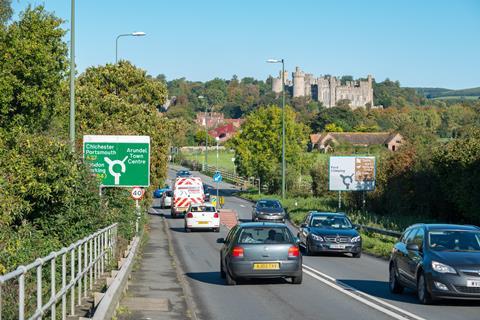National Highways has won the right to keep secret a KC’s advice on a controversial bypass project. The information commissioner previously ruled the advice should be disclosed in the public interest, but a First-Tier Tribunal has found that decision unlawful.
National Highways had received a freedom of information request for the advice from local resident Dr Emma Tristram, who ‘has long taken an active interest’ in the controversial A27 Arundel Bypass project. The project has become controversial in part due to the nearby South Downs National Park (SDNP), which campaigners say needs to be protected.

Proposals for five new routes have been canvassed. One, the Magenta Route, reduced the section of proposed dual carriageway that would pass through the national park. Another, the Grey Route, would avoid the park altogether.
National Highways chose the Grey Route, partly because of the advice from the silk - then a QC - which was said to have ‘over-ruled’ prior advice from solicitors that the Magenta Route would have a 50% chance of securing development consent. The QC put the prospects at less than 20%.
Dr Tristram wrote to Highways England in February last year, asking to see the QCs’ advice. National Highways refused, citing the Environmental Information Regulations 2004, which provide an exception when the course of justice, the ability of a person to receive a fair trial or the ability of a public authority to conduct an inquiry of a criminal or disciplinary nature would be adversely affected.
Dr Tristram complained to the information commissioner, who determined the exception was engaged but that the public interest lay in disclosure. At an appeal in the General Regulatory Chamber of the First-Tier Tribunal, three judges found the commissioner’s decision was ‘surprising and clearly wrong’.
Judge Anthony Snelson, and tribunal members Raz Edwards and Rosalind Tatam, said he had failed to attach ‘sufficient weight’ to legal professional privilege (LPP). ‘The fact a particular plan or project is significant and may have a severe impact on particular groups or communities or on public finances cannot begin to justify the disclosure of privileged advice’, the tribunal held. ‘If the law were otherwise, LPP would long ago have become a dead letter.’
It ruled the information requested was protected by LPP and National Highways is not required to disclose it.



























No comments yet